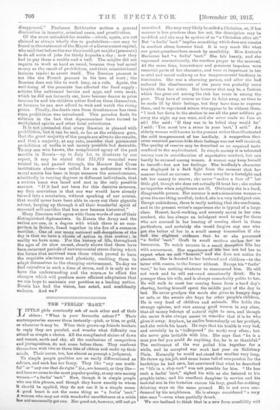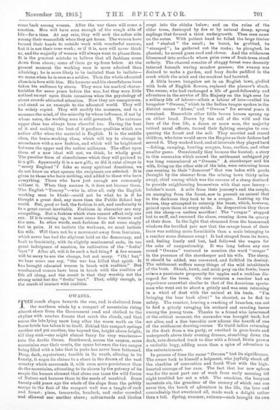THE "PEELIN"EART."
LITTLE girls constantly ash of each other and of their elders: "What is your favourite colour ?" Their contemporaries answer them instantly—pink, or blue, or gold, or whatever it may be. When their grown-up friends hesitate to reply they are puzzled, and wonder what difficulty can attend so simple a choice. All the complicated claims of dawn and sunset, earth and sky, all the confusions of comparison and juxtaposition, do not come before them. They confront themselves with two or three bits of ribbon and make up their minds, Their nurse, too, has almost as prompt a judgments To simple people qualities are as easily differentiated as colours, and each has her fancy. They like "any one truth- ful" or "any one that do right" (i.e., are honest), or they like— and here we come to the most popular qnality, at any rate among women—" a feelin"eart." Now, though it is simple people who use this phrase, and though they know exactly to whom it should be applied, they do not use it in a simple sense. A. good heart is not the same thing as " a feeling A woman who may act with wonderful unselfishness at a crisis has not necessarily got one. Her good :IAA, however, will not go unnoticed. She may very likely be called a Christian, or, if her manner is less gracions than her act, the description may be modified, and she may be spoken of as "a Christian after all," But "a feelin"eart " implies something Which does not consist in conduct alone, however kind. It is very much like what our great.grandrnothers meant by sensibility. Miss Austen's Marianne had " a feelin"eart." She felt keenly, and she expressed conventionally, the emotion proper 'to the moment'. At the same time, benevolence and generous impulses were essential parts of her character, and were as important in her mental and moral make-up as her temperamental tendency to histrionics. She was a charming person, and after she had endured the chastisement of the years was probably more lovable than her sister. But however that may be, a fashion which has gone out among the rich has Coins in among the poor. They have of course no time to faint away, no time to be made ill by their feelings, but they have time to express them, and to reprehend others who appear to be without them. "I took her down to the station to see all the poor soldiers go away the night, my son went, and she never made no fans at alll She said: 'If they was to be killed they would ha' I said: ' Yon must 'ave a stone in your 'cart,' I said." An elderly women well known to the present writer thus illustrated the cold temperament of her landlady. A suggestion that some reserved persons hide their feelings was not well received. The quality of reserve may be described as an acquired taste confined to the sophisticated. In simple society it is tolerated among men in consideration of superlative conduct, but can hardly be excused among women. A woman may keep herself to herself—but not her feelings. The landlady's character was displayed in a dark light from the moment that her manner found an excuser. She went away for a fortnight and left her canary to starve; she never " makes a fuss of"" her little girl, though she does not actually ill-treat her ; she makes no inquiries when neighbours are ill. Obviously she is a hard, disagreeable person. Her accuser is note. censorious woman—• given the one thing needful; indeed, ahe is a very indulgent one. Except unkindness, there is really nothing that she condemns, and in the present writer's experience she is typical of a large class. Honest, bard-working, and severely moral in her own conduct, she has always an indulgent word to say for those who are accused in her hearing of coming short in these particulars, and certainly she would forgive any ona who got the better of her in a. small money transaction if she had the slightest evidence that he or she possessed "a feelime 'east." Great in small matters strikes her as humorous. To watch success in a small deception fills her with amusement. Her experience of life has not led her to expect what we call "honour," and she doe§ not notice its absence. She is devoted to her husband and children—to the latter with reason, to the former without Except his "feelin' *cart," he has nothing whatever to recommend him. He will, not work and he will eat—and occasionally drink. He is younger than his wife, and is always remarkably polite to her. He will walk to meet her coming home from a hard day's chasing, having himself spent the middle part of time day its bed. He never grudges the meals she gives to hungry dogs or cats, or the sweets she buys for other people's children. He is very fond of children and animals. She holds the strange opinion, not rare among good women in any class, that all money belongs of natural right to men, and though she earns it she always seems to Consider that it is he who gives it away. Anyhow, he smiles benevolently on her proteWs, and she extols his heart. He says that his health is very bad, and certainly he is " indisposed" (to work) very often ; but she never gets irritable with him. She says that " he is a man you feel you could do anything for, he is so thankful." The excitement of the war pulled him together for a while, and he accepted war work last year on Salisbury Plain. Naturally he could not stand the weather very long. He threw up his job, and came home full of compassion kr the hardships he had seen, but convinced that what lie described as "life in a slop-cart" was not possible for him. "lie has such a feelin"eart," sighed his wife as she listened to his graphic tales; and his excellent daughter in service and his teetotal son in the trenches excuse his lazy, good-for-nothing drinking ways on the same ground. He is not even con- demned by his neighbours. He is always considered "a very nice man "—even when partially drunk.
We are inclined to think that in a new form sensibility will
come back among women. After the war there will come a reaction. Men will have seen enough of the rough side of life--fora time At any rate, they will seek the softer side among their womenfolk when they get home. The women have turned their bands to outside work with wonderful success, but it is not their true work ; or if it is, men will never think so, and the majority of women will always want to please them. It is the greatest mistake to believe that all fashions come down from above; some of them go up from below. At the present moment the working man is more admired than admiring; he is more likely to be imitated than to imitate— we mean when he is seen as a soldier. Then the whole educated class is in love with him, His humour and his cheerfulness have taken his audience by storm. They were his marked charac- teristics for some years before the war, but they were little noticed except upon State occasions when the psychology of street crowds attracted attention. Now they are conspicuous, and stand as an example to the educated world. They will be widely copied. They will modify the manners, and in a measure the mind, of the minority by whose influence, if not by whose votes, the working man is still governed. The extreme upper clan has always been cheerful too. Having the best of it and making the best of it produce qualities which are rather alike when the material is English. It is the middle class, the brain-working class, which will try to change in accordance with a new fashion, and which will be brightened between the upper and the nether millstone. The effect upon them of a new ideal will not, we think, be wholly good. The peculiar form of cheerfulness which they will pretend to is a gift. Apparently it is a new gift; or did it exist always in " merry England "e Like so many spiritual donations, we do not know on what system the recipients are selected. It is given to those who have nothing, and added to those who have everything. Those who have just enough are commonly without it. When they assume it, it does not become them. The English'" Tommy "—who is, after all, only the English working man in khaki—could not be what he is if he thought a great deal, any more than the Publio School boy could. But, good or bad, the fashion is set, and conformity is to a great extent inevitable. Fashions in character are very compelling. But a fashion which rises cannot affect only one sex. If it is coming up, it must come from the women and the men. In other words, such fashions do not come singly but in pairs. If we imitate the workman, we must imitate Lis wife. Will there not be a movement away from feminism, which never has had the slightest hold on the democracy, and back to femininity, with its slightly sentimental code, its too great indulgence of emotion, its cultivation of the " feeliu' 'cart " P After all, will it be such a bad thing P A few women will be sorry to see the change, but not many. " Oh I but," we hear some one say, "the war has killed that spirit. It Las brought educated women in touch with realities." But uneducated women have been in touch with the realities of life all along, and the result is that they worship not the strong mind but the " feelin"eart." That, oddly enough, is the result of contact with realities.















































 Previous page
Previous page